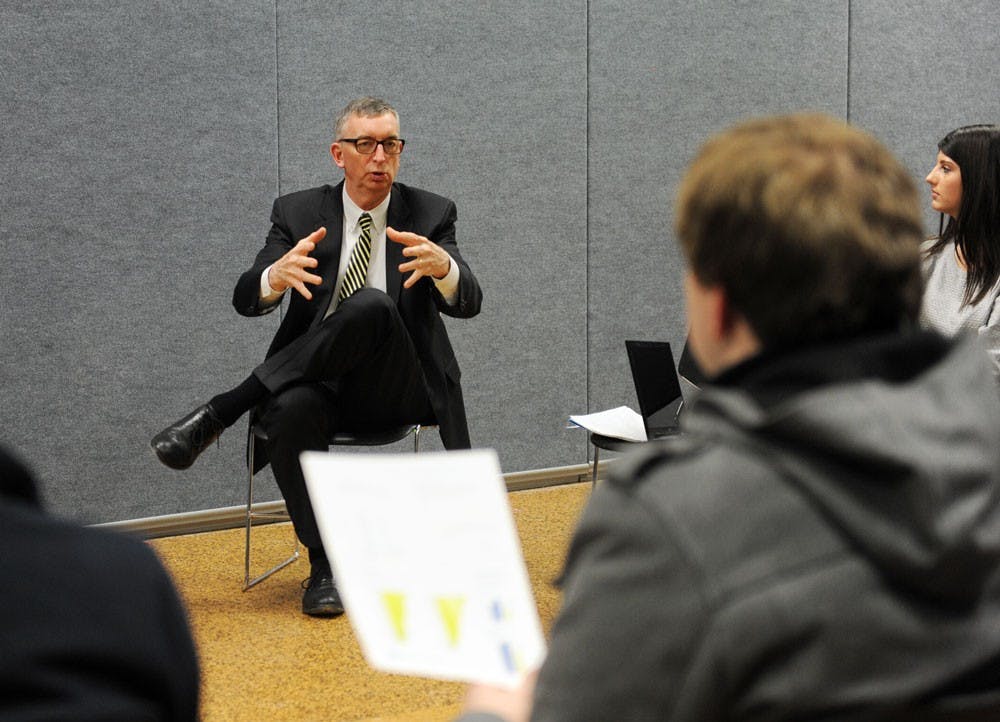All UB students will pay $300 more in tuition every year until at least 2020. But only about 10 to 15 students were present at a town hall style forum Wednesday night about tuition increases.
The Student Association Assembly held a “Rational Tuition Town Hall” forum in the Student Union for students to ask questions about NYSUNY 2020’s rational tuition program that limits SUNY schools to $300 annual tuition increases. Senior Vice Provost for Academic Affairs Scott Weber and Rob Mayer, director of State Relations who worked as a special assistant to Gov. Andrew Cuomo, answered student questions.
Melissa Kathan, SA Assembly Speaker and SUNY SA Chair of the rational tuition task force, said the event was not posted on the SA’s Facebook page until Monday night because that was when they got confirmation of the room and that Weber could attend. Kathan said that despite the low turnout, it was “reassuring” that everyone who did attend was “engaged and passionate.”
“With anything, more notice would always increase numbers,” Kathan said. “That being said, a lot of the input that we had, people were asking questions and were fully engaged.”
She also said some of the 10-15 students were non-Assembly members, which she was happy to see.
The SA Assembly officially endorsed renewing the plan on Feb. 25. SUNY is looking for student and school input because the plan will expire on Dec. 31, 2016 and the state is looking to extend the law to Dec. 31, 2020.
Weber advocated for the plan because he said it was predictable so students currently enrolled at UB and those looking to enroll could plan financially.
“We know the tuition is likely to rise, but can we moderate that rise in a predictable way and we can use those funds to predict the student experience on this campus for you who are paying those funds,” Weber said. “I think we’ve done a good job on that.”
Kathan said SA Assembly calculated that SUNY tuition increased 8 percent annually before the rational tuition plan in 2011.
“Affordability is a relative term,” Kathan said. “You’re talking about 10 years down the line, but you’re also talking about inflation of the economy.”
Mayer said the reason New York State does not just make this plan permanent is because the legislature reserves the right to review the program on a regular basis. Mayer travels to various governors’ offices and state legislatures to discuss what students want as far as rationing tuition.
Mayer said the reason why SUNY tuition rises were so unpredictable and not occurring on a regular basis in the past is the state legislature would use SUNY tuition to close budget gaps.
“If you look at periods when the state has fiscal crises or was having a hard time … it’s almost a guaranteed source of revenue [and that] would be raised and that money would be transferred back to what’s called the general fund,” Mayer said.
The general fund is a “big pot of money,” according to Mayer, that the state looks at and divides up among its different agencies and departments to meet budget obligations.
The general fund is currently about $142 billion, according to Mayer.
Mayer said NYSUNY 2020 uncoupled the legislature from having direct control on a whim as to when tuition would be raised and prevented it from being diverted into the general fund.
Weber said with rational tuition, the funds stay on campus and UB has used them to look at affordability and to fund programs – including Finish in 4.
Finish in 4 is a UB initiative that aims to help students graduate in four years. SUNY Chancellor Nancy Zimpher announced it would become a SUNY-wide program in January.
Weber said he does not expect all students to take four years to finish their college education, but said the national averages indicate that UB has worked hard to decrease the time it takes to get a degree. Weber said if students earn their bachelor degrees in four years, it allows for them to get into the next phase of their careers faster.
“We’ve increased both our four-year graduation rates and our six-year graduation rates conservatively over that time,” Weber said. “The other thing that we’ve done is we’ve added more faculty to improve the student educational experience that reduces or student to faculty ratio, which we think is important. So that’s really what we’ve been trying to do.”
Weber said UB is trying to gain state approval so the board has the authority to continue rational tuition for another five years.
Kathan said SA Assembly might be willing to have another forum if students are interested.
“If people voiced their concerns that they were still interested in this, we would love to be able to host another forum,” Kathan said. “Scott Weber said he’d be more than willing to do this again.”
She said SA Assembly would have a meeting next week about how the forum went and “where to go from here.”
Tom Dinki contributed reporting to this story.
Ashley Inkumsah is an assistant news editor and can be reached at news@ubspectrum.com





